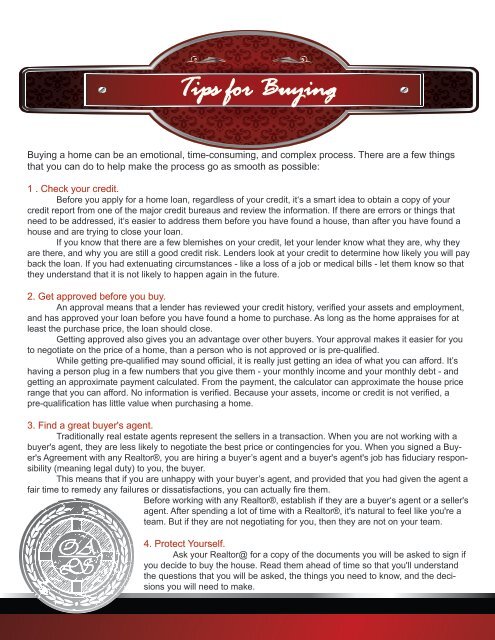Buyer Package
You also want an ePaper? Increase the reach of your titles
YUMPU automatically turns print PDFs into web optimized ePapers that Google loves.
Tips for Buying<br />
Buying a home can be an emotional, time-consuming, and complex process. There are a few things<br />
that you can do to help make the process go as smooth as possible:<br />
1 . Check your credit.<br />
Before you apply for a home loan, regardless of your credit, it‘s a smart idea to obtain a copy of your<br />
credit report from one of the major credit bureaus and review the information. If there are errors or things that<br />
need to be addressed, it‘s easier to address them before you have found a house, than after you have found a<br />
house and are trying to close your loan.<br />
If you know that there are a few blemishes on your credit, let your lender know what they are, why they<br />
are there, and why you are still a good credit risk. Lenders look at your credit to determine how likely you will pay<br />
back the loan. If you had extenuating circumstances - like a loss of a job or medical bills - let them know so that<br />
they understand that it is not likely to happen again in the future.<br />
2. Get approved before you buy.<br />
An approval means that a lender has reviewed your credit history, verified your assets and employment,<br />
and has approved your loan before you have found a home to purchase. As long as the home appraises for at<br />
least the purchase price, the loan should close.<br />
Getting approved also gives you an advantage over other buyers. Your approval makes it easier for you<br />
to negotiate on the price of a home, than a person who is not approved or is pre-qualified.<br />
While getting pre-qualified may sound official, it is really just getting an idea of what you can afford. It’s<br />
having a person plug in a few numbers that you give them - your monthly income and your monthly debt - and<br />
getting an approximate payment calculated. From the payment, the calculator can approximate the house price<br />
range that you can afford. No information is verified. Because your assets, income or credit is not verified, a<br />
pre-qualification has little value when purchasing a home.<br />
3. Find a great buyer's agent.<br />
Traditionally real estate agents represent the sellers in a transaction. When you are not working with a<br />
buyer's agent, they are less likely to negotiate the best price or contingencies for you. When you signed a <strong>Buyer</strong>'s<br />
Agreement with any Realtor®, you are hiring a buyer’s agent and a buyer's agent's job has fiduciary responsibility<br />
(meaning legal duty) to you, the buyer.<br />
This means that if you are unhappy with your buyer’s agent, and provided that you had given the agent a<br />
fair time to remedy any failures or dissatisfactions, you can actually fire them.<br />
Before working with any Realtor®, establish if they are a buyer‘s agent or a seller's<br />
agent. After spending a lot of time with a Realtor®, it's natural to feel like you're a<br />
team. But if they are not negotiating for you, then they are not on your team.<br />
OA SL<br />
4. Protect Yourself.<br />
Ask your Realtor@ for a copy of the documents you will be asked to sign if<br />
you decide to buy the house. Read them ahead of time so that you'll understand<br />
the questions that you will be asked, the things you need to know, and the decisions<br />
you will need to make.


